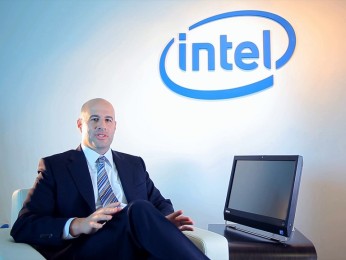 Chipzilla is gearing up for its 50th birthday next month, and Intel’s general manager of the Client Computing Group Gregory Bryant said now is not the time to write off Intel’s number one legacy – the PC.
Chipzilla is gearing up for its 50th birthday next month, and Intel’s general manager of the Client Computing Group Gregory Bryant said now is not the time to write off Intel’s number one legacy – the PC.
Bryant told the assorted throngs at Computex in Taipei the PC remains a critical facet of Intel’s business, and it’s an area where there are still many opportunities ahead.
“Most of us are already choosing the PC as the place to go to focus. In fact, when people need to get things done, over 80 percent turn to their PC. At the same time, we are more distracted than ever. Data shows that on average people are interrupted every three minutes. The nature of where, how and why we work is also changing. And the way people connect with one another has changed, with technology being a key driving force”, he said.
Bryant said that there is an opportunity to fundamentally improve the PC experience to meet today’s needs and help people focus on what is most important to them. To help them create and build a sense of community.
“But to make this leap, we need to innovate the PC around five key vectors: performance, connectivity, battery life, adaptability and intelligence”, he said.
“Our unwavering commitment to delivering the best performance continued as we announced the latest additions to our mobile lineup of the 8th Gen Intel Core processor family: the Whiskey Lake U-series and Amber Lake Y-series, featuring up to double-digit performance gains3 and integrated gigabit Wi-Fi. Expect more than 140 new laptops and 2 in 1s from OEMs starting this fall. And for desktop, by the end of this year, we’re delivering a new X-series release and the next Intel Core S-series processor.”
Beyond processing power, Bryant thought there was room for even more PC acceleration with the introduction of the Intel Optane SSD 905P, now available in an M.2 form factor.
“Delivering industry-leading endurance4, this new, slim Intel Optane SSD is a high-performance drive that allows the processor to spend less time waiting and more time computing, enabling users to enjoy an amazing computing experience”, he added.





